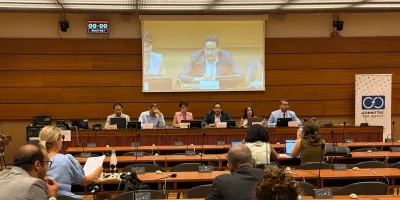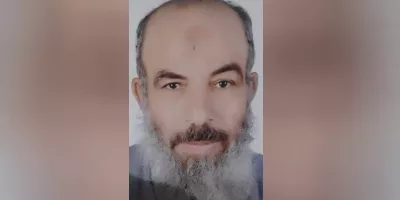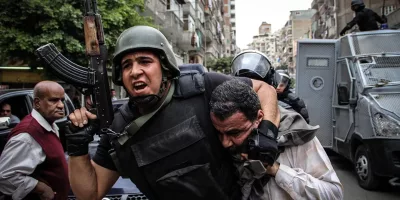The Committee for Justice said that under the pretext of fighting terrorism, the government of Egyptian President Abdel Fattah al-Sisi has effectively given officials at the Ministry of Interior and the National Security Agency the freedom to crack down on all dissent with near-total impunity for serious violations. The result has been one of the worst and protracted human rights crises in the country’s recent history.
The above was part of a complaint submitted by the organization to the Special Rapporteur on extrajudicial, summary or arbitrary executions regarding the allegations of the extrajudicial killing of Egyptian economist, Ayman Hadhoud, who had been forcibly disappeared for more than a month from 5 February 2022 prior to his death. The complaint was based on documentation carried out by CFJ.
CFJ said that it is likely that Hadhoud was specifically targeted for his role in investigating and challenging corruption among key regime officials. Moreover, the deceased economist had been known to the State Security since 2010, when he ran in the parliamentary elections against a senior official of the Mubarak regime at the time, Zakaria Azmy.
According to the statements of the Egyptian Public Prosecutor, Hadhoud (48 years old), was detained from the Zamalek neighborhood in Cairo on February 6, 2022. Two days later, a national security officer visited his family and told them that he was being held with them at the Ameriya police station, and that he would return home after completing his interrogation. On February 11, the family went to the police station to visit him, but officers denied his presence. The family learned from private sources at the time that he had been transferred to the Abbasiya Psychiatric Hospital.
In its complaint, CFJ said that Hadhoud’s family went to the hospital to check on him and visit him, but the hospital administration also denied his presence. After pressure from the family, the hospital administration admitted receiving him on February 23, but it prevented the family from visiting him. When the family went to the public prosecutor to obtain permission to visit him, they were informed that there was no open case under investigation against him. They were then informed by a family friend on April 1 of his death, but they were not officially notified until April 9, when they were told that he had died on March 5 but that his home address was not known, according to an official version.
Egypt: Ayman Hadhoud, Another Victim Of Extrajudicial Killing
CFJ added that when the family of Hadhoud received his body, they were immediately able to identify wounds on it, as well as skeletal damage and burn marks. The family also received calls from the National Security apparatus summoning them to discuss the death of Hadhoud. They have yet to receive an official autopsy report despite repeated demands by the family’s lawyer to issue an official copy of the autopsy and of the case files.
“Every day, there is a new Regeni in #Egypt, the last of whom is the economic researcher, Ayman Hadhoud, and it is a clear message from the Egyptian regime that it is proceeding nonstop in killing its opponents,” @AhmedMefreh9 | #veritaperGiulioRegeni https://t.co/OVYxd3loZs
— Committee For Justice (@cfjusticeorg) April 12, 2022
The Egyptian Public Prosecution issued on April 12 a statement saying that Hadhoud was arrested on February 6, 2022, from 15 Maraachli Street in Zamalek, Cairo, while trying to break into an apartment in a building at this address, adding that he was not mentally stable during the arrest. Therefore, the Public Prosecution decided that he was unfit for interrogation, and ordered his transfer to the psychiatric ward of Abbasiya Hospital, where it said he died of unspecified chronic heart disease, and that there was no criminal suspicion behind his death. On June 23, the Public Prosecution issued a decision to close the investigation into the case, amid doubts from the family’s lawyer that the prosecution’s goal since the investigations began was clear: acquitting the Ministry of Interior and the administration of Abbasiya Hospital.
CFJ stressed that the lack of accountability for the perpetrators of enforced disappearance or the violations that occurred during these periods is widespread in the Egyptian judicial and security services, and that Egypt uses enforced disappearance to grant the security authorities greater immunity for other crimes, like torture.
At the conclusion of its complaint, CFJ called for the intervention of the UN Special Rapporteur on extrajudicial executions to immediately oversee a comprehensive, transparent and independent investigation into Hadhoud’s disappearance and death, stressing the need for the Special Rapporteur to request an investigation through a mechanism free from the interference of the security services in the Egyptian state, as well as allowing the perpetrators to be held accountable.
The organization also reiterated its call to the Egyptian authorities to immediately stop their practice of enforced disappearance, the arbitrary use of pretrial detention, neglecting the health conditions of detainees, and obstructing legal procedures, noting that all of these violations facilitated a sharp deterioration in the rule of law in the country, and created a culture of impunity for extrajudicial killings against innocent victims.






